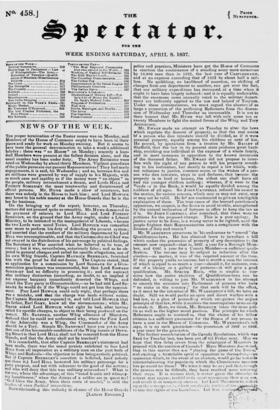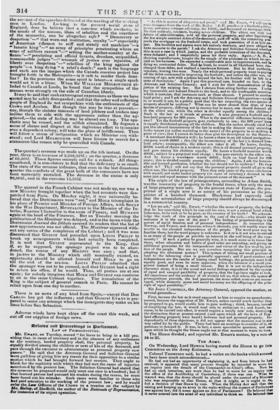NEWS OF THE WEEK.
THE proper termination of the Easter recess was on Monday, and Members of the House of Commons ought to have been in their places and ready for work on Monday evening. But it seems to have been the general determination to take a week's additional bolyday : there was " no House" on Monday ; scarcely a hun- dred Members were present at the fullest division since, and the coal number has been under forty. The Army Estimates were voted on Wednesday by about thirty Members. Vigilant guardians of the public purse are our present Representatives! They had made engagements, it is said, for Wednesday ; and so, between five and six millions were granted by way of supply to his Majesty, with as much ease and rapidity as if the money were " no object" to the people, military retrenchment a dream, and Lords HILL and FITZROY SOMERSET the most trustworthy and disinterested of official persons. Mr. HusiE made a show of resistance, but there was nobody in the House to back him ; and Lord Howtex may boast to his noble master at the Horse Guards that he is the boy for business.
On the bringing up of the report, however, on Thursday, matters did not proceed quite so smoothly. Mr. HUME demurred to the payment of salaries to Lord HILL and Lord FITZROY SOMERSET, on the ground that the Army ought, under a Liberal Ministry, to be intrusted to the management of Liberals, whereas the two Lords were noted Tories. Lord HOWICR was compelled once more to perform his duty of defending the present system; and asserted that the conduct of the military department by Lord BILL was unexceptionable, and that the Commander-in-Chief was not swayed in the distribution of his patronage by political feelings. The Secretary at War asserted what he believed to be true, of course ; but it was, nevertheless, notoriously false ; and as he ob- jected to general charges and called for specific allegations, one of his own Whig friends, Captain MAURICE BERKELEY, furnished him with the proof he did not desire. The Captain stated, that an application for a commission by Lord SEGRA.VE for a Glou- cestershire gentleman was unsuccessful, but that Lord EDWARD SOMERSET had no difficulty in procuring it ; and the aspirant after military distinction (according, no doubt, to an implied if not express bargain) immediately deserted the Whigs, and joined the Tory party in Gloucestershire,—as he had told Lord SE- ORATE he would do if the Whigs could not get him the appoint- ment. Poor Lord HOW1CK could only reply, that perhaps there Was a mistake, and that the charge was made without notice. But Captain BERKELEY repeated it, and told Lord Howtets that bis father, Earl GREY, knew all the circumstances ; while Mr. GROTE asked Lord Howlett what right he had, after having called for specific charges, to object to their being produced on the instant. Mr. SANFORD, another Whig adherent of Ministers, declared that ho could not understand why, when the First Lord of the Admiralty was a Whig, the Commandos of the Army should be a Tory. Simple Mr. SANFORD! have you yet to learn that one of the honourable conditions of the W big tenure of Down- ing Street is that Lord HILL shall not be removed from the Horse Guards, and that the Army shall not be touched? It is remarkable, that after Captain BERKELEY'S statement bad been made, there was the usual anxiety exhibited to free Lord BILL from all imputation as a military tnan on the part both of Mugs and Radicals—the objection to him being entirely political. But if Captain BERKELEY'S assertion is believed, (and nobody questions. it,) Lord HILL bestowed his military patronage for a party purpose, and not with reference to the good of the service; and who will deny that this was military misconduct ? What is the use, where the advantage, of this "bated bi oath and whispir- ng humbleness," when the doings of a soldier are in quest oil? "Grad bless the Army, bless their coats of scarlet;' is still the btu deu of even liadicul invocations.
Notwithstanding this unlucky di closure of the horse Guards
[LATEST EDITION.] policy and practices, Ministers have got the House of Commons to sanction the continuance of a standing army more numerous by 10,000 men than in 1822. the last year of CASTLEREAGH, and at an expense exceeding that of 1822 by about half a mil- lion. No quibbling. no hardihood of assertion, no shifting of charges from one department to another, can get over the fact, that our military expenditure has increased. at a time when it ought to have been largely reduced: and it is equally undeniable, that the enormous sums annually voted to the military depart- ment are indirectly applied to the use and behoof of 'Toryism. Under these circumstances, we must regard the absence of so large a proportion of the professing Reformers from the discus- sion of Wednesday and Thursday as inexcusable. It is not to their honour that Mr. Hiram was left with only some ten or twenty Members to fight the united forces of the Whig and Tory Aristocracy. Mr. EWART made an attempt on Tuesday to alter the laws which regulate the descent of property, so that the real estate bf a person who dies intestate should be divided, as if it were personal property, equally among his children or next of kin. He proved, by quotations from a treatise by Mr. BAILEY of Sheffield, that the law in its present state produces great hard- ship, enriching one individual at the expense of a whole family, and in most instances in opposition to the known intentions of the deceased father. Mr. EWART did not propose to inter- fere with the right of any person to will his property accord- ing to his inclination, but merely to repeal a law which, with- out reference to justice, common sense, or the wishes of a per- son who dies intestate, steps in and declares, that because the property is in land or houses, the eldest son shall have all and the younger children nothing ; whereas, if it were in the vends or in the Bank, it would he equally divided among the children of all ages. Sir JOHN CAMPBELL refused his assent to the motion, for certain reasons, which may or may not exist, may or may not be valid. He del not condescend to give an intelligible explanation of them. The true cause of the learned gentleman's opposition, we suspect, is the desire to avoid trouble, strengthened by the natural inclination of lawyers in office to keep the law as it is. Sir JOHN CAMPBELL also remarked, that there were no petitions for the proposed change. This is a poor apology. Is justice never to be done, is a wrong never to be righted, until the people frighten their Representatives into a compliance with the dictates of duty and reason ? Mr. W ARBURTON perseveres in "hie endeavour to " amend " the Qualification-laws. He has obtained leave to introduce a bill which makes the possession of property of any description to the amount now required—that is, 3001. a year for a Borough Mem- ber, and 6001. a year for a County Member—a sufficient quali- fication. The income may be subject to reduction after the election—no matter, it was of the required amount at the tune. If the property yields no income, but is worth a sum the interest of which is equal to so much a year—should it, for instance, con- sist of a library or a gallery of pictures—it will give a good qualification. Mr. SPRING Rica, who is unable to con- ceive how the entire abolition of Qualification-laws can be defended, is willing to join Mr. 1V ARBURToN in his attempt to smooth the entrance into Parliament of persons who have " no stake in the country ;" for that such will be the effect, as it must be the intention of Mr. WARHURTON'S bill, we have no doubt. Still we would prefer an open and direct warfare with a bad law, to a plan of proceeding which recognizes the unjust principle of that law, while it enables the unscrupulous more easily to evade it. Here, we think, Mr. Roenuest. takes the more poli- tic as well as the higher moral position. The principle fur which Reformers ought to contend is, that the choice of his fellow citizens is a sufficient guarantee fur the fitness of any person to have a seat in the House of Commons. Mr. NV ARBURTON's hill says, it is no such guarantee—the possession of 3001. or 6001. a year must be the guarantee. The further consideration of the Canada Resolutions, which was fixed for Tuesday last, has been put off till Friday next. May we hope that this delay arises from the reluctance of Minister: to proceed with the coercion of Canada? Have Ministers dtecovereds that in this matter they ale " playing the game of the Tori;•d,' and exciting a formidable spirit ut opposition to themselviee—an opposition which, in the event of an election, would go far towards counterbalancing the popularity which the Church-rate measure has procured for them? 1Ve Cruet it may be so; and th lt, tneugh the process may be difficult, they have resolved upon retracing their steps. It is certain that, h twever great the obstacle- to
retreat may appear, tenfold evils must accompany their p, esti, and result hr in temporary suceess. Let Lord Mul-HOURNIE rciket
upon the cline queness, which are of his1, -o
violate the Lights of tile C.inadians. Let him toneless ostailid\ the account of the speeches delivered at the meeting of the working
men in London. Lo(ling to the present social state of England, floes he believe that a measure which awakens, in the minds of the masses, ideas of rebellion and the overthrow of the monarchy, can be altogether safe ? " Democracy or despotism "—" that worn-out institution, royalty "—" superiority of American riflemen to stiff and stately red machines "—a " lunatic king "—" an army of principles penetrating where an army of soldiers cannot "—" setting the mother-country at de- Sallee "—" peculating and official tyrants, drunken, unqualified, irresponsible judges"—" triumph of justice over injustice, of liberty over despotism "—" rebellion of the king against the people "—a king dying " a rebel's death ;" such is the language and such are the images which the Canada coercion project has brought forth in the Metropolis—is it safe to render them fami- liar? In the provinces the same spirit is latent—a single spark would set it in a blaze. When Sir WILLIAM MOLESWORTH al- luded to Canada at Leeds, he found that the sympathies of the masses were strongly on the side of Canadian liberty. It may be said that such extravagant expressions as those we have quoted may be safely disregarded ; and that the sober and reflecting people of England do not sympathize with the enthusiasts of the Crown and Anchor. But though this may be true at present,— nay, though the sinister interests of land jobbers and traders may incline them to side with the aggressors rather than the ag- grieved,—the state of feeling may be altered ere long. The apa- thetic may be roused, and the selfish stimulated. By degrees a sense of shame and disgust at the inglorious effort to tyrannize over a dependent colony, will take the place of indifference. Then will follow a storm of indignation which no Minister can with- stand ; and Lord MELBOURNE will have leisure to search for a statesman-like reason why he quarrelled with Canada.



























